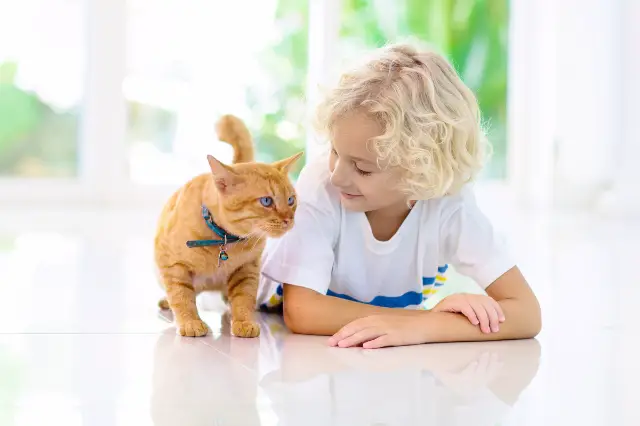How To Stop A 4-Year-Old From Hitting The Cat?
Generally,4-year-olds are pretty nice to their pets if the pet and the child have grown together, but in some cases, when the parents decide to have a pet when their child has reached four years of age may cause some trouble.
If you have adopted a cat as a pet and your 4-year-old is hitting it so often, then you need to address this behavior without delay and take necessary measures to ensure the child’s and the cat’s safety.
For that, first, you need to see why your 4-year-old is hitting the cat; only then can you figure out how to overcome such behavior.

Why does a 4-year-old hit the cat?
Finding out the reason your 4-year-old hits the cat is so important. Because when you know the reason, it is easier to solve the problem.
Following are the possible reasons why your little one is hitting the cat.
1- He thinks that the cat is a stuffed toy.
Your 4-year-old might be hitting the cat because he cannot figure out that the cat is a living creature who can feel the pain and get hurt. He may think the cat is a stuffed toy, just like he has in his toy closet. So, he would play, hit, squeeze, and pull its tail, considering it a stuffed toy.
2- He is testing his limits.
4-year-olds usually test their limits to see what can happen if they do such and such things.
Maybe your 4-year-old is hitting the cat to see how long the cat resists his hitting and mishandling. The cat may have scratched your 4-year-old, but he would not consider it a lesson and wants to see how much he can annoy the cat.
3- He is experiencing “What can do what.”
Children at this age love to do experiments and want to explore as much as possible. Your 4-year-old might be hitting or annoying the cat to see how it will behave in different situations.
He wants to know how the cat behaves when he pulls its tail or how the cat reacts when he hits it with a toy.
4- He gets curious about the cat’s actions.
You would agree that a cat is such an adorable pet, and its actions are even cuter that you cannot resist saying “Awww.”
Purring, meowing, scratching, turning upside down, all actions make it even more attractive.
As elders, we understand a cat’s behavior, but your 4-year-old might not understand it and gets curious about it. And out of curiosity, he might hit the cat or mishandle it.
5- He hits the cat because he does not have self-control.
Some kids express their love wildly and do not have the self-control to express it. Even if you teach your child to be gentle and kind with the cat, he might still randomly hit the cat for no apparent reason.
Preschoolers have little impulse control; when they are excited, upset, or bored, they may hit the cat despite being taught not to do so.
6- He has seen someone hitting the cat in the cartoon.
Cartoons these days do promote hitting animals in a fun way. Your 4-year-old might have seen such cartoons. Thus, he tends to hit or annoy the cat.
7- His parents hit the cat.
Cats are cute but sometimes they become annoying especially when you are tired and want some time alone.
No matter how much your cat annoys you, never hit or throw the cat in front of the kids or behind them. Always set an appropriate way to tackle an annoying cat.
If your 4-year-old is hitting a cat, he might have seen you or someone in the house treating the cat poorly.
8- He is jealous of the cat.
I understand that having a pet cat means endless “Awww moments” throughout the day.
A cat has that charisma that attracts everyone around it.
Hence you may be expressing more love and paying more attention to the cat rather than your child, which makes him jealous of it.
9- He is taking out his frustration on the cat.
Sometimes a child might hit the cat because he is frustrated with something. For example, he might be angry with the parent’s behavior and take out his frustration on the cat.
This behavior needs immediate action because it would bring more aggression and cruelty in his nature, and he might end up hitting the cat terribly.
10- He does not know what worst can happen if the cat hits back.
Because of the fearless nature of 4-year-olds, they never think of the consequences when they explore the world around them.
Therefore, the primary reason for cat hitting is that the child does not know what worst a cat can do in return.

This post may contain affiliate links. Read our disclosures here.
What to do if a 4-year-old keeps hitting the cat?
Now, you know what’s the reason. It’s time to find out what to do about it.
1- Address his curiosity:
4-year-olds are at the stage of life where they become curious about almost everything around them.
Most of all, children are so fearless at this age that they do not give a second thought when approaching danger.
So if you find your child curious about the cat’s acts, tell him why the cat meows, purrs, scratches, or turns upside down.
A proper introduction to the cat will help a lot. Feed your child’s curiosity. Tell him what to expect from a cat and how to behave with it.
Get him storybooks that introduce the cat and its behavior. There are plenty of books available on Amazon that you can just order now.
Check out the Cat Storybook collection on Amazon.

2- Improve their bonding:
Improve the bonding between your 4-year-old and your cat. But make sure their activities together are supervised. Let your child feed the cat. Engage him in bathing the cat.
The time your child will spend with the cat will make him understand how a cat works. He might become gentle with the kid.
Just ensure that you don’t let them play alone.
3- Take preventive measures.
If your child is involved in hitting the cat now and then, you cannot sit back and keep the child and the cat alone, thinking that he would overcome it.
Always stay alert when the cat and your child are together.
4- Model appropriate petting style.
Children always learn what they see. So when the cat comes to you, tell your child how appropriately to pet it. Use words like “be nice” and “be gentle” when you see your child approaching the cat.
5- Become interested in your child’s world.
Keenly watch your child and note his mood when he hits the cat.
Get involved with him and find out the reason for his aggression towards the cat. For example, a child may hit him because of frustration, anger, anxiety or sadness, etc.
6- Closely monitor what he is watching.
Entirely ban cartoons that promote violence. Children adopt most of the things from their surroundings and what they watch.
7- Get books on how to behave with pets.
So many books out there teach how to keep pets safe.
I have a lovely suggestion for a book called “A Kids Book About Caring for a Pet” by the Dodo; this book mainly teaches how to take care of your pet because once the pet comes to the house, it becomes part of the family.
8- Teach empathy and self-control.
By age 4, you and your child can talk about empathy and self-control in so many ways.
Explain to your child how he gets hurt if someone scolds or hits him, the same way an animal also gets hurt and feels sad when someone hits it.
Teach him that when you love someone, you don’t need to express your love wildly but gently.
Moreover, if you think your child is hitting the cat out of anger, you must help him find other ways of releasing his frustration. For example, tell him that he can squeeze a rubber ball or punch a punching bag when he feels angry.
9- Don’t give more priority to the cat than your child.
I understand that having a pet cat is full of adorable moments, but never give more attention to the cat than your child. Your child matters the most, so do take care of the pet, show it affection, and feed it properly, but don’t forget your child in between all this.
10- Separate the cat and the child if he continues to hit it.
Hitting is unacceptable in any case, so if your child continuously hits the cat, separate them immediately.
Tell the child it’s because you are not nice to the cat; we have to put him in another room until you promise not to hurt it anymore.
11- Tell him the consequences if the cat attacks back.
Let’s be realistic here, never hide the fact from the child that a cat can also attack back to defend itself.
So teach the child never to hit the cat, and even if he wants to pet it, do it gently, not harshly.
Conclusion:
A 4-year-old hitting cat is not usual. Many kids at this age are friendly with their pets but your kid might not be comfortable with the cat yet or he might be curious about it.
The best approach is to use the proper introduction. The more your child knows about the cat, the more he will be gentle with them.
Talk to them more about cats, let them know how cats are different than toys, and get them cat storybooks.







